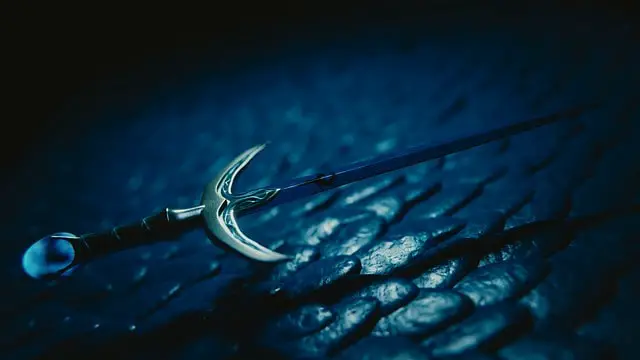Roleplaying a warlock in D&D is fairly easy. Think about what makes a warlock. With that, you will have infinite roleplay potential.
Roleplaying a warlock in D&D is completely dependent upon your patron. Each patron and your relationship with them will change your personality.
A warlock is the most natural class to roleplay. While clerics have a god that grants them spells, you made a pact with your patron. That means that you have and will continue to communicate with them, and they want something from you.
The pact
Making your pact as a warlock is everything. You need to consider every aspect of making a pact. Start with what caused you to create the pact. Were you a child who just got a hold on some forbidden text and didn’t know what you were doing? Did your patron save you? Was it a bargain where you would do something for your power?
You have to take into consideration why your character made a deal with this unearthly being, but it doesn’t have to be so conventional. For example, you might have died and were sent back by a celestial to accomplish a task. This task might be making the world a better place or just a specific task. Either way, if you veer from your patron’s path you are dead.
Roleplaying a Warlock in D&D does not just end with how you formed a pact. The nature of the pact will influence your character as well. You made a pact with this entity for some reason. You wanted something out of this deal. It could just be power, but it could be something more. Think about what that deal will do to your character and how your goal is being influenced by this deal.
Conversely, why in the world did the entity make a deal with you? What do they want, and is it really worth it? For most warlocks, the answer is no. You might want to break away from your patron at some point and that is not going to be easy. We will talk about this later on, but your patron will want to keep a hold on their investment.
The pact can be a verbal agreement, 1 written in blood, or an agreement that the player doesn’t even really remember. However it is done, most warlocks make it out of haste. It is a quick and easy way to power, so most making these deals are uninformed or don’t think about the consequences.
The pact even forms how you will play your warlock! Are you using this magic to conjure weapons, a pure focus on spellcraft, what? Whatever you chose, this can influence why your character made a pact and who they are. Already, you can see that the pact affects every single aspect of a Warlock and if you solidify everything about your pact you will roleplay an amazing warlock.
Now, aside from the pact, in general, let’s talk about how different warlock pacts can influence your roleplaying.
Archfey

Roleplaying a warlock in D&D with the archfey patron is nice. Or at least, it seems nice. While those other warlocks are selling their souls you have just made a pact with the fey and that doesn’t sound too bad, does it?
Of course not! You might just want to have a little bit of fun and this archfey has taken a liking to you. It is all joy, sunshine, and rainbows as you laugh about killing someone! Wait…
Every patron’s influence can affect a Warlock directly or indirectly. Warlocks who roleplay the archfey patron are generally lighthearted and might want to play jokes on others. These jokes for fey can become something nasty though.
A prank for an archfey might involve you slipping on marbles into needles which will possibly poke out your eye. Not a very nice image, but this is just a prank and the more damage 1 takes the funnier it is!
Fey are a little messed up, and that will most likely come out in your roleplay. If your patron actually wants something of you then having an archfey might be your worst choice. They will have no qualms about keeping things that are valuable to you until you have finished your task. Like your eye, leg, or arm.
Archfey are unpredictable and like to enjoy life. Even if their concept of fun is terrifying.
Celestial
You have reached out to the heavens for an answer, or help, but instead of receiving the aid of a god you received the aid of a powerful angelic being.
You can start your relationship this way or you can do something more fantastic like being sent back until a task is done.
Either option will impact how you will be roleplaying a warlock in D&D.
For the nature of what the pact does itself, it can be very beneficial. You are making a deal with an angelic being after all and are trying to do something good! Or at least, something that is good in the eyes of an angelic being.
Think about this, would you want to live in a world filled by lawful good people? No one is evil and everyone is only lawful good.
If the answer is yes, then you have not considered how it can go horribly wrong. People act selfless and don’t have any real desires of their own. Progress can halt, or worse. People will do everything to qualm evil so witch hunts and other activities to hold up the ‘greater good’ will become commonplace.
Too much good is an evil itself, and your patron might have fallen to that folly. They want the world to have justice prevail, and thus will have you kill a family who is stealing to stay alive. A child who has nowhere to go and is crying might be thrown in prison for breaking curfew, and if anyone looks at a forbidden tome that could cause harm death is required. Circumstances do not apply.
This is how the patronage could be negative, but you will also most likely change. The influence on your person might make you more cold to worldly issues and hold lofty ideals too highly. A celestial pact is not always a positive thing. Unlike the fiend which is almost always bad.
Fiend

You made the smart decision to make a deal with a devil. First, you are an idiot. Second, you got what you wanted, but at what cost?
Roleplaying a warlock in D&D with the fiend pact is almost never a good thing. You could be a murderer who made a pact to help you improve your murdering skills, but aside from this most fiends don’t want anything good. They are making a deal with you and WILL get something in return.
There is no lofty ideal or good nature in them, they will always want to gain something. This can come in many forms. From accomplishing a specific task to being a vague servant. You might never hear from them again actually since the bargain was your soul at the end of your life (which might even stop resurrection).
Fiends at best will leave you alone for your soul, but they will influence your character. Your character might never get a good night’s sleep. They will think less of others and start to become more jaded about the world around them. Upon taking the features of a fiend they might start to think more like 1.
Making a pact with a fiend will constantly influence your character and there is almost no positive spin on it aside from the powers that you gain.
This pact has been explored a lot in fiction so I won’t go into it further, but 1 pact that no one understands very well is the pact for the old ones.
Great old one
Roleplaying a warlock in D&D with the great old one’s pact is possibly the most interesting. Why I say this is because it doesn’t make any sense. How did you even contact a great old one when they are supposed to be dead, imprisoned, or slumbering?
This has to be a fluke in reality, and what the great old one’s want might not make sense either. You are essentially making a pact with Cthulu or an eldritch creature like him, and this makes things weird in a few ways.
- They may not want something standard.
- Logic is unimportant.
- Insanity is reasonable.
For not wanting something standard, your patron could require an odd task from you. Whenever someone finishes a sentence you have to end it with a certain sound. When you come across a certain color you need to make a mark in it. Or, you can do what I did with an NPC.
Her name is little Cadence. She is living in an occult bar run by adventurers and has been exposed to a lot. This made powers take an interest in her, and she always has to count 2’s and 3’s. If there are 3 chairs she must count out loud ‘1,2,3.’ Whenever asked about her powers she starts spewing nonsense that might be prophetic. No one knows, especially not her.
In this instance, the little warlock developed OCD because the more she does it the more she helps her patron. How? That is completely up to the DM.
She spews forth nonsense when asked about why she counts and thinks it is normal. “The crow strikes thrice when the bread crumbles” isn’t a normal response to “Why are you counting?” This response makes sense to her though, so she is confused about why the others don’t get it. Insanity is reasonable and she is completely insane at times.
These are some ways how serving a great old one might be able to influence your character, but let’s move onto less disturbing patrons.
Hexblade

Hexblade is a strange subclass for a warlock. Your patron isn’t something specific like an archfey, fiend, or even great old one. Instead, you serve a patron that has maybe become a weapon or has forged/stolen/created? a weapon for you.
Roleplaying a warlock in D&D as a hexblade allows your patron to be anything which is a very unique way to roleplay, but it also allows for your bond with a weapon.
This might involve the warlock in question obsessing over their weapon and starting to call it ‘precious’ if it goes too far, but it can be more interesting than that. Most of your abilities are about cursing an enemy, so what if when you kill someone your blade steals their soul?
Roleplaying a hexblade is going to be a unique experience because aside from this there aren’t really any general tips for roleplay that will apply to you other than what we have stated. So go and make something completely unique for your hexblade!
Undying
This is a strange subclass like most of the warlock subclasses. Here you have made a pact with a powerful undead being (most likely) and are serving them. This could be a lich, wizard, or whatever. The main takeaway from this is that you are serving a being who is granted power over death, and that will be given to you.
Roleplaying a warlock in D&D this way is almost terrifying. You could start to become cold and lifeless physically making your skin pale and your eyes/skin sunken in. Your emotions could start to deteriorate as well until you become as exciting as a zombie.
You asked your patron for some form of power, possibly over life, and in return, they could ask for the normal things. Do a task, serve this way, etc but a more subtle way of forcing you to serve them is by slowly draining your life force. You could become more loyal over time as your life starts to fade until you are somewhere in-between death and undeath.
It is a truly terrifying concept, but something to be considered. That and the possible fascination with death, feeling other beings’ life force, and other weird obsessions.
But what if you want to break free from the pact?
Severing the pact
Roleplaying a warlock in D&D has a lot of negatives. You have read that every single pact can have a downside. Serving someone for quick power is not all sunshine, and those downsides can be too big for you to continue. Especially if your patron starts asking worse things of you and keeps altering the deal.
So you want to get rid of your patron, but how? The first thing that you need to know, is that it will not be easy.
You cannot just walk out of an iron-clad agreement. They gave you something in order for you to do a task. You need to do that task or you are not upholding your end of the bargain. So in order to weasel your way out of it, you will require some way to usually overpower this entity that gave you power or take it to a higher power that will help you.
If you are overpowering your patron, then they need to be found and beaten to a pulp. This generally will not happen for a while, and even then there are risks involved.
As for getting a higher power to help you, this is the most common way to get rid of a truly strong patron. You can ask a god to help you and help that god in some way, or you can show some higher power that the contract was breached by the patron and you should be set free.
However you do this, it will not be an easy task and there will be repercussions. Going against your patron may make them cut you off from a part of your power or all of it. There will be consequences, but you should retain most of your powers since they were given to you.
Conclusion
Roleplaying a warlock in D&D is almost 100% based around your patron. Why and how you made the pact is 1 thing, but what the patron desires of you and how the patron influences you is another.
You might end up thinking torture is just a fun way to get information. Reality is subjective, or become cold to other’s plights. Having a patron will affect you, and it will impact how you roleplay your warlock.
Every patron is unique and will have unique circumstances. Some might not actually be harmful to your character, but that is unlikely. Most of the time, it might seem harmless but ends up doing something terrible.
Getting out of that abusive relationship is also not an easy task. You will have to go through quite a lot in order to get out of your agreement with your patron, so be prepared. That is, if you even can find a way out.
I hope that I have helped you with roleplaying a warlock in D&D!
Also, if you want to check out our other guides on how to roleplay different classes then check out our theory blogs here!
Until next time, keep larping!





Hey thanks, very well explanation on the patrons, i have been playing with the undying and found your article very helpful. You can add expanded spells list on these patrons, and other patrons also arouse after the updates. I have been learning this game and will be looking for more content. As i want to make this game popular in my region i am also writing some content on warlock.any thanks for the knowledge